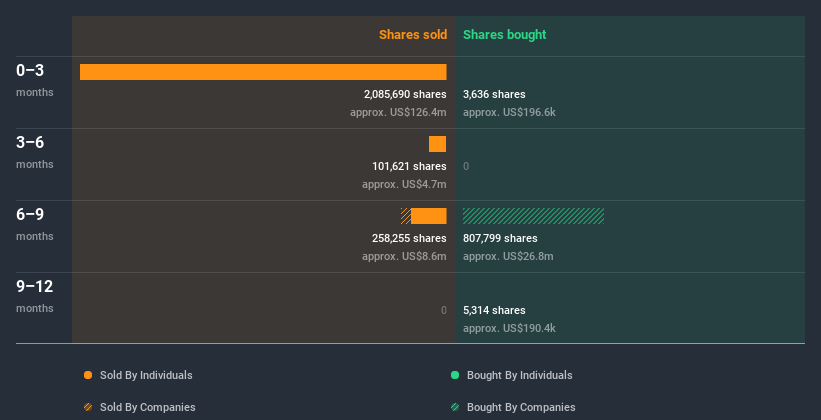We wouldn't blame The Charles Schwab Corporation (NYSE:SCHW) shareholders if they were a little worried about the fact that Charles Schwab, the Founder & Chairman recently netted about US$34m selling shares at an average price of US$65.29. However, it's crucial to note that they remain very much invested in the stock and that sale only reduced their holding by 0.4%.
The Last 12 Months Of Insider Transactions At Charles Schwab
In fact, the recent sale by Founder & Chairman Charles Schwab was not their only sale of Charles Schwab shares this year. They previously made an even bigger sale of -US$37m worth of shares at a price of US$60.95 per share. So it's clear an insider wanted to take some cash off the table, even below the current price of US$67.14. We generally consider it a negative if insiders have been selling, especially if they did so below the current price, because it implies that they considered a lower price to be reasonable. While insider selling is not a positive sign, we can't be sure if it does mean insiders think the shares are fully valued, so it's only a weak sign. This single sale was just 0.5% of Charles Schwab's stake.
All up, insiders sold more shares in Charles Schwab than they bought, over the last year. The sellers received a price of around US$58.31, on average. It's not particularly great to see insiders were selling shares at below recent prices. Of course, the sales could be motivated for a multitude of reasons, so we shouldn't jump to conclusions. You can see a visual depiction of insider transactions (by companies and individuals) over the last 12 months, below. By clicking on the graph below, you can see the precise details of each insider transaction!

If you like to buy stocks that insiders are buying, rather than selling, then you might just love this free list of companies. (Hint: insiders have been buying them).
Insider Ownership of Charles Schwab
For a common shareholder, it is worth checking how many shares are held by company insiders. I reckon it's a good sign if insiders own a significant number of shares in the company. Charles Schwab insiders own 6.9% of the company, currently worth about US$8.7b based on the recent share price. Most shareholders would be happy to see this sort of insider ownership, since it suggests that management incentives are well aligned with other shareholders.
What Might The Insider Transactions At Charles Schwab Tell Us?
The insider sales have outweighed the insider buying, at Charles Schwab, in the last three months. Zooming out, the longer term picture doesn't give us much comfort. It is good to see high insider ownership, but the insider selling leaves us cautious. While we like knowing what's going on with the insider's ownership and transactions, we make sure to also consider what risks are facing a stock before making any investment decision. You'd be interested to know, that we found 2 warning signs for Charles Schwab and we suggest you have a look.
If you would prefer to check out another company -- one with potentially superior financials -- then do not miss this free list of interesting companies, that have HIGH return on equity and low debt.
For the purposes of this article, insiders are those individuals who report their transactions to the relevant regulatory body. We currently account for open market transactions and private dispositions, but not derivative transactions.
This article by Simply Wall St is general in nature. It does not constitute a recommendation to buy or sell any stock, and does not take account of your objectives, or your financial situation. We aim to bring you long-term focused analysis driven by fundamental data. Note that our analysis may not factor in the latest price-sensitive company announcements or qualitative material. Simply Wall St has no position in any stocks mentioned.
Have feedback on this article? Concerned about the content? Get in touch with us directly. Alternatively, email editorial-team (at) simplywallst.com.
The views and opinions expressed herein are the views and opinions of the author and do not necessarily reflect those of Nasdaq, Inc.


